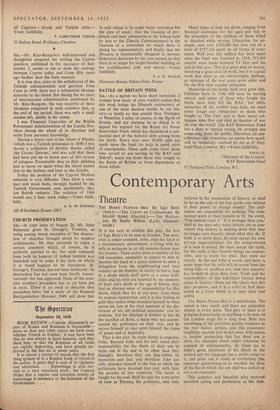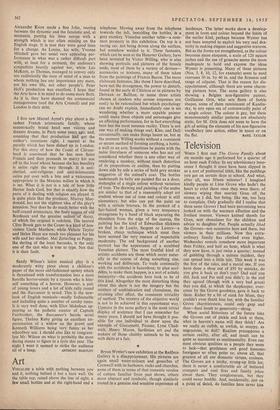Contemporary Arts
Theatre
IT is not easy to criticise this play, the first of Ugo Betti's to be seen in London. The story even is rather complex. John, once the head of a revolutionary government, is living with his wife in seclusion in an old customs house near the frontier. There arrive there a number of his old associates, ostensibly to appeal to him to become the head of a peace mission to meet a delegation from the neighbouring and rival country on the frontier, in reality to betray him to a death which shall serve as a emus hell r. John and his wife are haunted by the memory of their son's death at the age of fifteen; they feel an obscure sense of responsibility for that death, which they try to put away from them by mutual reassurance, and it is this feeling of guilt that makes John abandon himself to what seems his fate at the vital moment of the dis- closure of his old political associates' real in- tentions. Yet his fatalism is broken at last by the sacrifice of Rosa, a nurse who has accom- panied the politicians on their visit, and he nerves himself to take upon himself the cause of peace and of humanity.
That is the plot. Its main theme is responsi- bility. Because John and his wife reject their responsibility for the death of their son (it turns out in the end to be other than they thought), therefore they are hag-ridden by memories and fear, and therefore John can only abandon himself to the fate to which the politicians have doomed him and, with him, the peoples of two countries. The battle is fought for his soul. Shall he take the same point of view as Thomas, the politician, who only believes in the mechanism of history, or shall he be on the side of the free spirits who believe in their power to change events? The poli- ticians arc responsible for nothing. The com- monest word in their mouths is 'it,' the event. 'You cannot resist it? 'It is stronger than you.' And so the men who make history are so con- vinced that history is making ,them that they no longer care morally about what they do. If John is to resist them, he must accept his own private responsibilities, for the comportment of a man is united. He must accept the truth, for the truth is that human beings are respon- sible; and to know for whiit, they must see clearly. At the end John is saved, and there is some hope that his wife will be saved from the rising tides of madness too, now that sincerity has broken in upon their lives. Truth and the responsibility of the individual human being alone in history—these are the ideals that this play proposes, and it is a relief to find them stated in a form which is at once clear and subtle.
The Burnt Flower-Bed is a melodrama. The action is very rapid, and there are peripeteia almost in every scene. This play of ideas is as gripping dramatically as anything to be seen on the London stage for a long time. Betti has something of the primitive quality common to the best Italian writers, and this passionate simPlicity enables him to get away with scenes (a mother pretending that her dead son is alive, for example) which might otherwise be accused of sentimentality. At times (as in John's great statement of his ideals in the second act) the language has a poetic surge to it, and great use is made of symbolism (the recurrent questioning. as to whether the doot of the flat in which the son died was locked or not is an example).
This complex and beautiful play received excellent acting and production at the Arts. Alexander Knox made a fine John, veering between the dynamic and the fatalistic and, at moments, putting his lines across with a strength which is too often missing on the English stage. It is true they were good lines for a change. As Louisa, his wife, Yvonne Mitchell gave her usual very appealing per- formance in what was a rather difficult part with, at least for a moment, the audience's sympathies heavily against her, while Leo McKern, as Thomas, managed to convey only too realistically the state of mind of a man to whom nothing has any importance any more, not his own life, not other people's. Peter Hall's production was excellent. I hope that the Arts have it in mind to do some more Beni. As it is, they have shamed the commercial managements (and the Arts Council) and put London in their debt.
I first saw Marcel Ayme's play about a de- cadent French aristocratic family, whose eccentrically brutal head sees visions and dreams dreams, in Paris some years ago, and, assuming that that production had got the author's intentions right, I marvel at the parody which has been dished up in London. For this story of how the Count of Cleram- bard is convinced that he has seen Saint Francis and then proceeds to marry his son off tp the local whore because she has humility is satire right the way through. It is anti- clerical, anti-religious and anti-aristocratic satire put over with a bite and a viciousness appropriate to the Mauriac milieu in which it is set. What it is not is a tale of how little Hector finds God, but that is exactly how the parts of it dealing with religion are played. It is quite plain that the producer, Murray Mac- donald, has not the slightest idea of the play's intention. Nor does he do much better with the half-crazed aristocracy, the fusty aroma of old Bordeaux and the genuine sadism of decay, of which the original is redolent. The nearest Clive Brook gets to the Count is a kind of less- violent Uncle Matthew, while Valerie Taylor and Helen Haye are much too pleasant for his wife and her mother. Mai Zetterling as Poppy, the darling of the local barracks, is the only one of the cast who is true to type. Not that it is their fault.
*
Sandy Wilson's latest musical play is a moderately witty piece about a children's paper of the more old-fashioned variety which is threatened with transformation into a most horrific horror-comic by a tycoon who is him- self something of a horror. However, a pair of young lovers and a lot of kids rally round and the Buccaneer is saved. This is the new- look of English musicals—madly fashionable and including quite a number of catchy tunes. It is very well done, with Eliot Makeham ap- pearing as the pathetic creator of Captain Fairbrother, the Buccaneer's heroic serial figure, Thelma Ruby giving an excellent im- personation of a widow on the prowl and Kenneth Williams being very funny as her schoolboy son. I should also like to congratu- late Mr. Wilson on what is probably the most daring stanza to figure in a lyric this year. The night I went it seemed to strike the audience



































 Previous page
Previous page